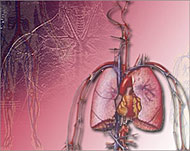Heart disease gene discovered
Scientists have discovered the first gene to be identified as a cause of heart attacks.

In data published on 28 November, researchers from the Cleveland Clinic showed that a mutation of the gene MEF2A discovered in an analysis of the genetic makeup of 21 members of an Iowa family – has a direct causal relationship with coronary artery disease and heart attacks.
Researchers found that certain elements, representing 21 base pairs of nucleotides and seven amino-acids, were missing from the gene in the Iowa family, which had been plagued for generations by incidents of coronary artery disease.
“What we discovered is a deletion mutation,” said Eric Topol, chairman of the Department of Cardiovascular Medicine at the Cleveland Clinic. “This deletion affects coronary artery walls, making them less able to protect themselves from plaque build-up and heart disease.”
Topol said it is unlikely other families will be found with the exact same genetic mutation. But researchers will seek to identify smaller mutations involving the same gene that may be less dramatically linked to heart disease.
 |
|
Researchers say people play a big |
People with the exact genetic mutation of the Iowa family have a 100% chance of having a heart attack or developing coronary artery disease, Topol said.
‘Not if, but when’
“For them, it’s not a matter of ‘if’, it is a matter of ‘when.’ For that reason, we think this specific mutation will prove to be rare. Most genes that will be discovered to induce heart attack will be more common and not carry as high a risk,” he said.
Regardless of genetic predisposition, researchers say individuals play a large role in preventing the onset of heart disease through willingness to control their weight, blood pressure and diet, he said.
The MEF2A gene makes a regulatory protein that controls the expression of hundreds or even thousands of other genes in the endothelium, the barrier between blood vessels and blood elements.
The scientists suspect that mutations to the gene weaken the endothelium, making it more susceptible to invasions and attacks by certain large cells. That allows the formation of atherosclerotic plaques.
“Finding the gene opens a new avenue through which scientists can track the pathway that leads to coronary heart disease and heart attack,” said Qing Wang, in whose laboratory the discovery was made.
Future research will focus on pinpointing the roles of the missing nucleotide pairs and amino-acids, and of seeking ways of counteracting the affect of the shortfall on the artery walls, the researchers said.